Y-12 Blog
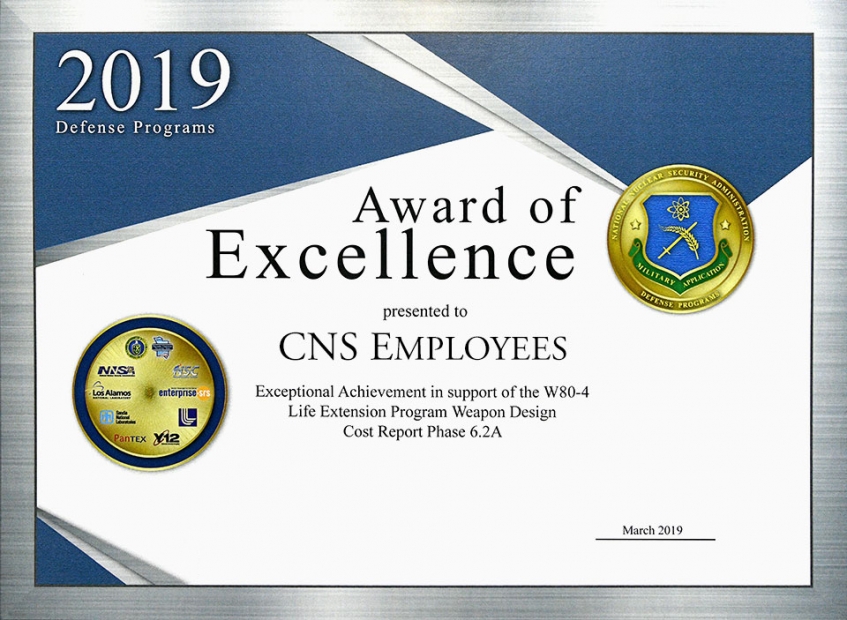 Members of the CNS W80-4 Life Extension Program recently received an NNSA Defense Programs Award of Excellence.
Members of the CNS W80-4 Life Extension Program recently received an NNSA Defense Programs Award of Excellence.
It’s a busy time in the modernization world at Pantex and Y-12 as employees continue working on the B61-12, W88 Alt 370 and W80-4. The W80-4 Life Extension Program (LEP), is a long-range standoff cruise missile that will be used by the U.S. Air Force in the bomber leg of the nuclear triad. Pantexans and Y-12ers are working to refurbish, reuse or replace the warheads’ nuclear and non-nuclear components to extend the service life of the warhead for an additional 30 years while improving its safety, effectiveness, and security.
This level of work has not been seen across the Nuclear Security Enterprise in more than 30 years and will require close coordination and integration with all involved to effectively and efficiently ensure all milestones and deliverables are met.
The Pantex team is working to produce, formulate, and qualify two new insensitive high explosive material streams for the LEP. To meet this challenge, they are working with Lawrence Livermore National Laboratory and Holston Army Ammunition Plant to develop and qualify new IHE material.
Working with older infrastructure and tooling is another challenge for both Pantex and Y-12. The legacy tooling was not designed to the tighter assembly, so that requires all of the tooling supporting operations on this program to be re-designed, prototyped and put in place.
At Y-12, they are appreciating a new approach the nuclear design agency has taken to meeting design requirements. Previously, Y-12 had to rely on reused and partially rebuilt components as there are significant challenges in making all new components. However, the design agency, Lawrence Livermore National Laboratory, is simplifying where possible, taking advantage of additional reuse opportunities, and working as a real partner to minimize burdens on existing Y-12 capabilities.
There have been challenges with this LEP, such as compressing the schedule by two years, but there have also been successes. Those successes earned the Pantex and Y-12 W80-4 teams an NNSA Defense Programs Award of Excellence.
Obviously, working on three LEPs at one time will present competing priorities and challenges for Pantex and Y-12. With teams like these, the sites are well positioned to be more efficient. It is imperative because the nation requires it.
 UPF Ironworker Robert Burchfield was chosen as Local 384’s Apprentice of the Year and represented the local union at the 30th Annual Outstanding Apprentice of the Year Competition in Atlanta, Georgia.
UPF Ironworker Robert Burchfield was chosen as Local 384’s Apprentice of the Year and represented the local union at the 30th Annual Outstanding Apprentice of the Year Competition in Atlanta, Georgia.
Uranium Processing Facility Ironworker Robert Burchfield was chosen as the Apprentice of the Year from Ironworkers Local 384. He represented the local union in the Ironworkers District Council of the Southeastern States 30th Annual Outstanding Apprentice of the Year Competition during June in Atlanta.
Ironworkers 384, based in Knoxville, represents union members from parts of Georgia, Kentucky, North Carolina, South Carolina, Tennessee, and Virginia.
Fourteen apprentices participated in the two-day competition that tested their abilities in seven skill areas including welding, climbing a column, tying rebar, and rigging. The competition is a way to recognize outstanding apprentices and is an opportunity for them to get to know each other. The apprentices visited the Atlanta training center to see how ironworkers there learned some of their techniques.
“One cool part was we all brought a t-shirt from our local union and exchanged them with the other guys,” Burchfield said.
Awards were given in multiple categories. Burchfield won third place in tying rebar.
“We do a lot of that at UPF,” he said.
Burchfield has worked at UPF as an apprentice for 14 months. Every few months during the three-year apprentice program, apprentices attend specialized training classes to learn core ironworker skills like rebar, rigging, scaffolding, and welding. This is combined with on-the-job training. Burchfield started his apprenticeship in August 2017 and has about a year left to complete before he becomes a journeyman.
This is the third year in a row that Local 384 has sent an apprentice to compete. Burchfield was nominated by his training coordinator based on reports from work and observations from his training classes.
“It’s an honor to be chosen,” Burchfield said.
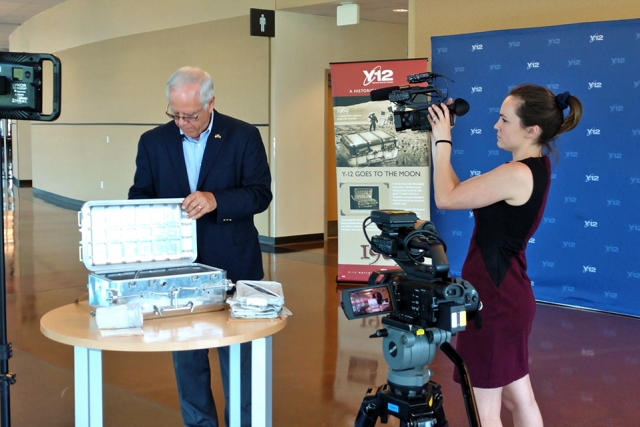 Paul Wasilko shows Emily DeVoe of WBIR one of the moon boxes built at Y-12 for the Apollo missions.
Paul Wasilko shows Emily DeVoe of WBIR one of the moon boxes built at Y-12 for the Apollo missions.
“The biggest benefit of Apollo was the inspiration it gave to a growing generation to get into science and aerospace.” – Buzz Aldrin, Lunar Module Pilot, Apollo 11
Who didn’t once dream of being an astronaut in the 1960’s? Paul Wasilko of Program Integration certainly did. In fact, he was quite disappointed to be attending the annual Boy Scout Jamboree in Idaho with 34,000 other scouts in July 1969 when the moon landing was going to occur.
Paul did get to see the moon landing … with narration by astronaut Frank Borman and a special greeting from astronaut and fellow Eagle Scout Neil Armstrong live from the moon. The scout who watched that moon landing now has his own tie to Apollo 11 history—sharing how Y-12 played an important role in that mission 50 years ago.
In 1967, Y-12 produced 16 moon boxes, or Apollo Lunar Sample Return Containers, for NASA to safely handle the lunar material. It also provided support to the design of the Lunar Receiving Laboratory to process the samples brought back from the moon.
The moon boxes were not the first collaboration with NASA. A few years earlier, Y-12 built blood sample containers for Gemini as part of a study to determine if space flights adversely affected human blood. (Spoiler alert: It doesn’t.) That project, which was known as Blood in Gemini, was the start of a beneficial partnership between the agencies.
As we reflect on the past, it’s always good to look forward. Today, our partnership with NASA is focused on fueling the next space mission through demonstrations like KRUSTY (Kilopower Reactor Using Stirling TechnologY) or nuclear thermal propulsion. Morris Hassler and Chris Robinson of Global Security and Strategic Partnerships are leading Y-12’s work in those areas.
From past to present and future, a WBIR special airing on Tuesday, July 16, will celebrate the 50th anniversary of Apollo 11, including the role Oak Ridge and Y-12 played and continues to play in exploring the final frontier. Be sure to tune in on Tuesday. You might see some familiar faces.
 The final topping slab was placed at the Salvage and Accountability Building allowing structural steel installation to take the building vertical. Foundations for all UPF main buildings were completed ahead of schedule.
The final topping slab was placed at the Salvage and Accountability Building allowing structural steel installation to take the building vertical. Foundations for all UPF main buildings were completed ahead of schedule.
When the final topping slab for the Salvage and Accountability Building was placed it marked a major milestone for the UPF project – all foundations for the main UPF buildings were complete. The UPF team completed this milestone ahead of schedule.
“There were no major challenges to the SAB final placement other than the sheer size of the slab, which was about 17,000 square feet,” said Deputy Area Manager Randy Holman. “The prep work accomplished by the civil team set up the concrete placement team for success.”
The final topping slab placement was carefully coordinated. It took 11 concrete trucks a total of 92 trips back and forth between the onsite concrete batch plant and the SAB. The close proximity of the batch plant had major benefits for a placement of this size. The subcontract technical representative could quickly travel between the site and batch plant to personally oversee quality, and fewer trucks were needed because they made quicker runs.
The final placement required 885 cubic yards of concrete and was completed during a night shift. Placing concrete at night allowed the finishers to work during the daytime; concrete hardens quicker in the sun with the daytime heat than in the cooler evenings, so finishing work was completed in a shorter period of time. Working through the night resulted in less construction site traffic and congestion, which reduced the potential for concrete delivery delays as the trucks travelled between the batch plant and project site.
“Completing this milestone enabled us to begin SAB structural steel installation with the initial 17,000 pound, 60 foot steel columns,” said SAB Federal Project Director Don Peters.”
| Fast Facts | |
|---|---|
|
Did you know? Base slab vs. topping slab |
The base slab is the main structural slab designed to carry the entire building load, which is why the structural anchor bolts are embedded in the base slab. The topping slab is an additional slab with embeds that allow equipment to be attached. The base slab is constructed first, and the topping slab is constructed on top of the base slab. | Salvage and Accountability Building |
| Base Slab | 9,000 cubic yards |
| Topping Slab | 2,300 cubic yards |
| Main Process Building | |
| Base Slab | 23,000 cubic yards |
| Topping Slab | 4,500 cubic yards |
| Mechanical Electrical Building | |
| Base Slab | 5,500 cubic yards |
 Concrete crews place 885 cubic yards of concrete during a night shift at the Salvage and Accountability Building.
Concrete crews place 885 cubic yards of concrete during a night shift at the Salvage and Accountability Building.
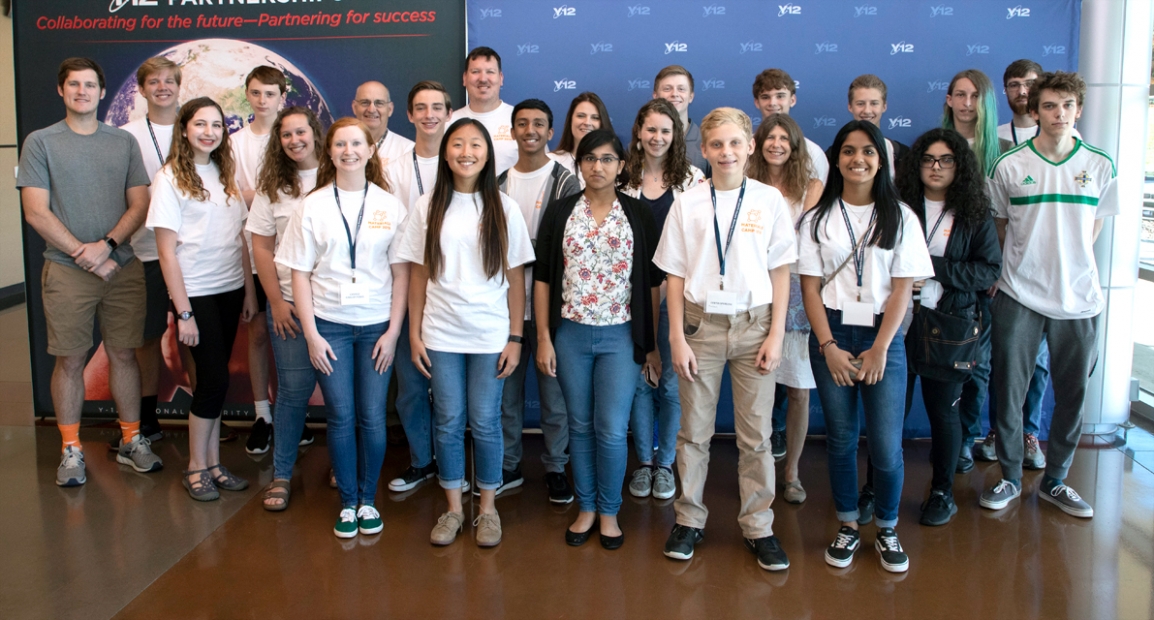 Materials Camp participants, their instructors, and University of Tennessee student volunteers at the Y-12 National Security Complex’s New Hope Center.
Materials Camp participants, their instructors, and University of Tennessee student volunteers at the Y-12 National Security Complex’s New Hope Center.
To understand how and why things work, sometimes you have to take a close look. A really close look. Avery, a Roane County High School senior, did just that at this summer’s Materials Camp, sponsored in part by the Y-12 National Security Complex.
She and 14 other East Tennessee high school students studied nickel, iron, aluminum, copper, and other metals not by opening a textbook but by heating, hammering, grinding, bending, rolling, and polishing the materials.
“We learned how these materials behave under certain conditions and stresses,” Avery said. “Then we examined their microstructures, the different grain structures, using a scanning electron microscope and other analytical equipment.”
One of the campers’ favorite activities was pounding a hot iron bar with a forging hammer during the blacksmithing demonstration. “That was really fun and cool,” said Avery, who wanted to make sure everyone, including her camp instructors, got in a few whacks at the bar.
“Avery wasn’t going to let us leave until I had a chance to take out some aggression on that metal bar,” said Dr. Claudia Rawn, one of the camp coordinators and associate professor in the University of Tennessee’s Materials Science and Engineering department and director of UT’s Center for Materials Processing.
Having fun while learning is all part of the camp formula. Through hands-on activities and an escape- room scenario, camp instructors introduced students to materials science, which involves the properties of materials and their application in everything from high-performance electronics and airplanes to stents, heart valves, and other biotechnologies to renewable energy.
“I think all of the students now have a different view that everything is made of a variety of materials and there are opportunities to have a fascinating education and career with materials,” said camp coordinator Bob Bridges, a Y-12 metallurgist.
Before the weeklong camp, many of the students had never heard of materials science. “Most high school students thinking about majoring in an engineering discipline don’t know about materials science and engineering,” Rawn said. “A lot of STEM-oriented students know they want to major in engineering, and knowing about materials science and engineering helps them to make a more informed choice.”
The camp not only serves as a recruiting tool for area colleges but also feeds the workforce pipeline. Y-12 sponsors the camp as part of its educational outreach efforts to develop the science, technology, engineering, and math skills the site will need in the future.
“Because of this camp, I’m thinking about pursuing an education in materials science,” Avery said. “It got me thinking about different avenues for college and a career.”
In addition to UT and Consolidated Nuclear Security, which manages and operates Y-12 for the National Nuclear Security Administration, camp sponsors included the ASM Materials Education Foundation and Pellissippi State Community College.
Electron Optics Instruments and IXRF Systems, Shimadzu Scientific Instruments, Mager Scientific, and Carl Zeiss Microscopy provided almost $400,000 worth of equipment for students to use as well as staff to train campers on how to use it.
“This camp would not be possible without the huge number of volunteers who work with the students behind the scenes and donate equipment and provide expertise,” said Teri Brahams, executive director for Economic and Workforce Development at Pellissippi State Community College.
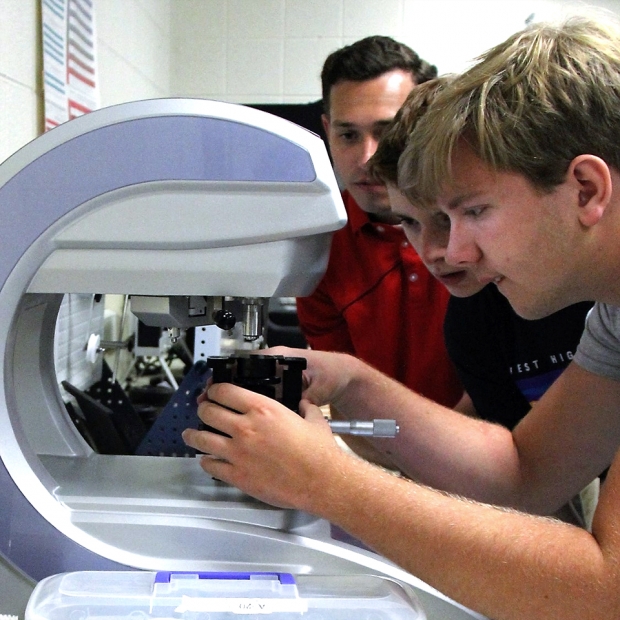 Materials Camp students use a hardness tester to compare the relative hardness of a control sample to an unknown heat-treated sample.
Materials Camp students use a hardness tester to compare the relative hardness of a control sample to an unknown heat-treated sample.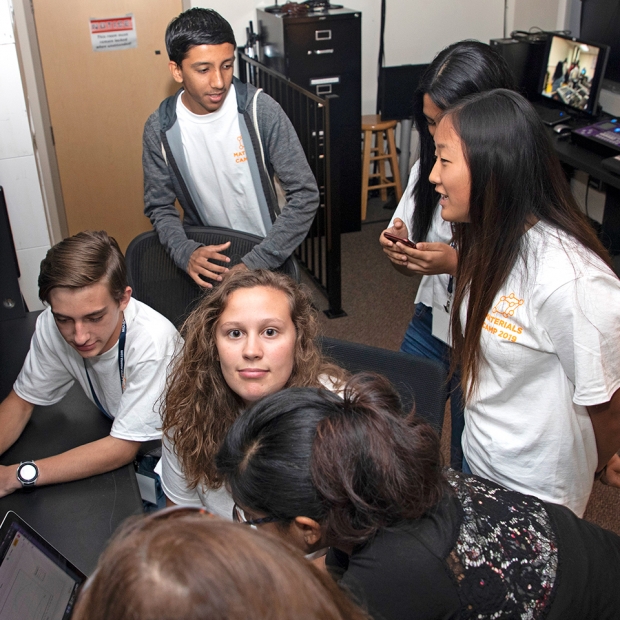 Roane County High School senior Avery (center) and other Materials Camp students work on their presentation for the final day of camp. Materials Camp “got me thinking about different avenues for college and a career,” said Avery, whose father is an electrician at the Y-12 National Security Complex.
Roane County High School senior Avery (center) and other Materials Camp students work on their presentation for the final day of camp. Materials Camp “got me thinking about different avenues for college and a career,” said Avery, whose father is an electrician at the Y-12 National Security Complex.